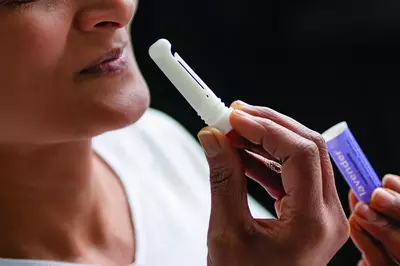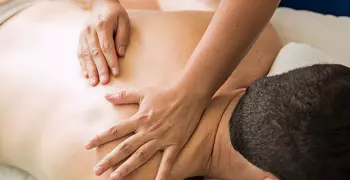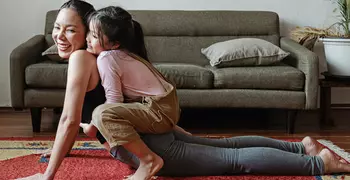Integrating Aromatherapy into Your Lifespan and Survivorship Journey

What is aromatherapy?
Aromatherapy is the use of essential oils that come from plants. When utilized correctly it can be a useful tool for managing symptoms and improving general wellbeing. Clinical aromatherapy is the use of these oils to alleviate symptoms and promote wellbeing. You might find aromatherapy helpful to manage pain, nausea, anxiety, and insomnia and to promote a general sense of wellbeing. But it is not a cure or treatment for disease. It is a good idea to involve your healthcare team in discussions around how you plan to use aromatherapy.
While aromatherapy can undoubtedly be a helpful tool, there is a great deal of misinformation on the internet about how to safely use it. Much of this information comes from companies who are trying to sell you their product, and very little of the available information is geared towards someone who has received chemotherapy or undergone radiation. Conversely, the information on Taking Charge of Your Wellbeing was written with you in mind. In this beginner's guide to using aromatherapy at home, you’ll find helpful tips of how to use essential oils safely. We’ll also clarify some common misconceptions about aromatherapy.
Aromatherapy for beginners
First, let’s start with some friendly advice for anyone interested in trying aromatherapy at home.
What are the easiest ways to practice aromatherapy at home?
- Start small. Pick three essential oils you are interested in based on the needs of you and your family and learn more about them.
- Get essential oil education from a reputable source. The Food and Drug Administration prohibits companies who sell essential oils from providing clinical education or advice. Remember, multi-level marketing companies provide marketing, not clinical advice or education.
- Determine how to use essential oils safely. (Only use them for inhalation or topical application only. Do not ingest essential oils.)
- That said, have fun! There are many safe and effective ways to incorporate aromatherapy into your self-care routine.
Special considerations
Remember that there are special considerations for using essential oils with sensitive groups, especially children.
- Children under the age of two should never use essential oils.
- Children under the age of six should only use oils under the guidance of a healthcare professional.
- Make sure to store your essential oils away from young children, just as you would a medication.
- Those who are pregnant or those with a chronic health condition should seek input from a healthcare professional before starting an at home aromatherapy regimen.
How to use essential oils
In the United States, you can safely use essential oils in two ways: inhalation and topical application.
Inhalation
Breathing essential oils is a powerful way to send messages right to the brain. When you inhale an essential oil, the active chemicals in the oil go directly to the part of your brain that controls your emotions and hormonal responses. Inhalation is considered the safest and most effective method for using essential oils. However, avoid inhaling essential oils if you are experiencing respiratory distress or reactive airway disease. Take care to only inhale them intermittently– not around the clock. Try inhaling them for an hour and then taking a break. It’s okay to fall asleep with some essential oils present in the bedroom as long as there is good ventilation.
Note that if you plan to inhale the essential oils, you do not need to dilute them.
Topical application
Applying essential oils on the skin, where they are absorbed, is another way to experience their beneficial effects. Certain oils may irritate the skin, so it is important to know some basic information to safely use essential oils in this way.
If you plan to apply essential oils to your skin, it is best to purchase a prediluted formulation or follow these guidelines for diluting them yourself. However, we don’t recommend that you mix different types of essential oils yourself, as it is more effective to purchase blends created by an experienced aromatherapist.
Start with a small area the first time and choose a less-sensitive area of skin. The outside of the forearm is a good place to test how your body reacts to an essential oil.
What to avoid with topical application:
- Avoid applying essential oils to rashes, wounds, or non-intact skin
- Don’t get the oils in or near the eyes, nose, or mouth. The face, skin folds, and genitals are considered sensitive areas that should typically be avoided.
- Avoid dressing, bandages, central lines, or other adhesives. The oils may loosen or prevent a dressing from sticking securely to your skin.
- Use the oils with caution if you have a history of sensitive skin, skin reactions, or if you are on medications that may increase skin sensitivity, such as topical steroids, chemotherapy, or immunotherapy drugs.
- If you have a history of graft-versus-host disease (GvHD) of the skin, consult a member of your healthcare team before using topical essential oils.
- Similarly, if you have a cancer diagnosis that specifically impacts your skin, you should also talk to your team first.
- If you begin to notice signs of redness, itching, or irritation, wash the area with soap and water, pat dry, and leave the skin open to air. Once you are certain you are not sensitive to an oil, you may use it cautiously on the face, but continue to avoid the eyes, nose, or mouth.
- While it’s rare, an essential oil may be aggravating. Make sure to use the oils in a way that allows you to quickly clear the area if this happens. Remember, applying essential oils topically will always result in some amount of inhalation of the oils.
For an at-home beginner, which five essential oils are must-haves? What can they be used for?
Here are some ideas to get started:
- Use lavender essential oil to decrease anxiety and enhance sleep. Try placing a few drops on a piece of cotton and placing it on your pillow when you go to bed at night. Take several slow deep breaths as you relax your body.
- Use sweet orange or bergamot essential oils to increase your energy and enhance your mood. Place a few drops on the tile in the corner of the shower for your morning shower. Take several slow deep breaths before letting your mind race to the busy day ahead.
- Rosemary essential oil can be used to aid mental alertness, memory, and sinus congestion. Place a few drops in a diffuser or in a pan of simmering water on the stove. Breathe deeply while keeping your eyes and nose a safe distance from the water and oil mixture. Rosemary can be very strong and may irritate the eyes if you get too close. Older children could also use a few drops of rosemary essential oil on a piece of cotton while studying.
- Use peppermint or ginger essential oil for nausea. Place a few drops on a piece of cotton and bring it on long car rides for family members who suffer from motion sickness.
How to store essential oils
In general, most essential oils are good for one year after they are opened if they are stored properly. Be sure to check the product expiration dates to ensure you are aware of when they expire.
- Follow these guidelines to best store your essential oils:
- Store in a cool, dry place, away from direct sunlight or heat.
- Ensure it’s tightly sealed and kept upright.
- Keep them away from small children and pets
How Aromatherapy can be used for all ages
Aromatherapy can be a great addition to your home care routine. By following these guidelines, you can avoid harm and enjoy the benefits of aromatherapy for your whole family!
Using aromatherapy safely
Aromatherapy can be a nice addition to your family's daily routines. However, while they can offer many benefits, some oils can be extremely hazardous for small children or for individuals with certain medical conditions. Infants and children with underlying medical issues such as asthma, reactive airway disease, epilepsy, a weakened immune system or many others, should always seek guidance with aromatherapy from a licensed healthcare professional.
Infants
There is currently no evidence to support the safe use of essential oils for infants or children under the age of two. Children under two, especially infants, do not have developed nervous systems or organ function. Because of this, substances that may be deemed “calming” for most are actually noxious and toxic for infants and small children.
Many products like lotions, creams, and bath soaps marketed for infants either have a very small amount of essential oil present in the product, or are filled with artificial alternatives to enhance the fragrance. This is important to know because these products are unlikely to have a therapeutic effect.
Tips for use with infants
If you have children under two, you can use aromatherapy, but need to be cautious. Here are some helpful tips when small children and infants are present:
- Diffuse in an open, spacious room.
- Use generally safe oils: lavender, citrus, frankincense, bergamot.
- Diffuse intermittently—not continuously or all day.
- Keep essential oils out of reach and in a safe place.
- Do not have a diffuser blowing on the child.
- Avoid diffusing in the child's room.
- Do not diffuse in a hot steam shower with an infant present.
- Do not put directly on your children’s skin or in open cuts or scrapes.
Children
It is safe to use aromatherapy with children two years and older when you follow the safety guidelines for inhalation or topical application. Storing the essential oils safely is a primary concern with this age group. Many essential oils smell like familiar foods, so children may try to drink the oils. They may also think the oils are a lotion or perfume and try to slather them all over their bodies, potentially getting into their eyes and nose. Always keep oils in a safe place and out of reach.
Below are some of the most helpful uses of aromatherapy with this age group:
Tantrums
If your child is prone to tantrums, lavender, bergamot, and chamomile might help. It can be helpful to start the diffuser 20 minutes before a transition time, i.e., when getting ready to leave for the day or when returning home in the evening.
Sleep
Sleep is often challenging with children. Starting a bedtime routine that includes aromatherapy could be helpful, especially if you include the child in creating the routine. A few oils to help with sleep include lavender, ylang ylang, chamomile, and frankincense. Try starting your diffuser 30 minutes before bedtime to start your routine. If you have one of these oils diluted in a carrier oil, teach your child to rub some oil on their feet or maybe give them a foot massage while telling a bedtime story.
Growing pains
Children are growing rapidly, which can cause growing pains. Aromatherapy paired with light massage can work wonders for soothing their aching pains. Oils such as marjoram, chamomile, and frankincense can help alleviate muscle tension and promote relaxation. We recommend purchasing a pre-blended oil that is already diluted in a carrier oil. Remember, less is more.
Young adults
As a young adult, you know your own symptoms and stress, so you can explore which oils help. (For caregivers reading this, young adults are more independent and better able to communicate their needs, so you can engage them in choosing essential oils.)
Young adults may be experiencing stress from school, social media, and sports, all in addition to a consuming diagnosis and treatment plan. Aromatherapy can be a wonderful addition to help promote relaxation, support calmness, ease aching bodies, and improve focus. Here are a few examples to give you ideas:
- To start the day, you can try some citrus oils like lemon, sweet orange, and bergamot to wake up the body and mind and improve focus.
- It may also be helpful to smell calming oils throughout a particularly difficult day, like the day of an exam or doctor’s appointment. Essential oils with calming properties include lavender, sweet orange, blue cypress, and frankincense.
- If you are experiencing body aches and pains related to treatment or an active lifestyle, you might find aromatherapy paired with massage very helpful. Oils such as marjoram, chamomile, and frankincense can help alleviate muscle tension and promote relaxation. It is best to purchase a pre-blended oil that is already diluted in a carrier oil.
Adults
Aromatherapy is helpful for an assortment of adult needs, such as stress, sleep, mood, and even headaches. Try finding areas in your day-to-day life to incorporate aromatherapy. Here are a few examples to give you ideas:
- Start your day with a shower and add few drops of rosemary, eucalyptus, or bergamot in the corner—these can boost your mood and awaken your body and mind.
- If you have a headache, try massaging diluted rosemary and frankincense oil onto your temples, forehead, and on the back of your skull where your neck meets your head.
- Help the whole family prepare for bedtime by diffusing lavender and blue cypress 30 minutes before bedtime.
- Additionally, try massaging these diluted oils into the area just behind your ears to keep the benefits going throughout your sleep.
Elderly
Elderly individuals are often more sensitive to aromatherapy than adults, so they should use less of the essential oils and be sure not to use them constantly throughout the day. Elderly individuals typically have fragile skin, so more of the oils are absorbed. Also, essential oils may have interactions with medications, so always be sure to tell your healthcare team what oils you use frequently.
Any of the recommendations for the other age groups can be used with and around elderly individuals. Just be aware of underlying conditions, and if any adverse reaction occurs, stop using the oils and seek medical attention.
Aromatherapy myths & misconceptions
Ever read the claims that aromatherapy might cure cancer or at least eczema? The web is full of false claims about a lot of things, but in recent years, essential oils have become a hot-topic item. This section will help dispel common myths and misconceptions about aromatherapy.
Myth #1: Aromatherapy cures cancer
Unfortunately, this is a myth. Some small and low quality studies have examined the effects of specific components of essential oils on cancer cells in a petri dish. There have been no studies to suggest that taking an essential oil can have any impact on cancer growing in the human body. In fact, it can be dangerous to use some essential oils if you are fighting cancer, as they can have an impact on cancer growth in the human body. Read more about the safety of essential oils.
Important Caution
In some countries, people swallow essential oils. This is not a common practice in the United States. We don’t know much about the safety of ingesting essential oils, so be cautious.
Myth #2: More is better!
Many essential oil companies suggest that you use essential oils in every aspect of your life. Clean your house with them, brush your teeth, drink them, breathe them- the list goes on and on. The truth is, the body responds better when small amounts of essential oils are used intermittently. Your body can become sensitive to essential oils over time with excessive exposure.
It’s also important to remember that these oils came from natural resources. They should be used conservatively just like any other natural resource. In fact, some essential oils come from endangered species of plants and should be avoided altogether. Sandalwood is one example of an endangered species that is still being harvested and added to soaps, lotions, candles and other products.
Myth #3: Essential oils are natural products, so they must be safe
In reality, natural does not mean safe. Did you know that some of the first chemotherapies were also derived from plants? Lead is a natural substance, but we know that exposure to it isn’t healthy for children with developing brains. Essential oils are highly concentrated potent substances. They can have therapeutic benefits, but they can also be harmful to the body and interact with medications. Read more about the safety of essential oils.
Myth #4: It’s a good idea to get information about essential oils from a friend or family member that is selling them
Although friends and family members are well-meaning, it is important to not confuse marketing for medical advice. Information coming from companies that sell essential oils is not scientifically or medically sound. It is intended to sell products. In fact, the FDA has warned several essential oils companies to stop labelling products with misleading information. The FDA warns that medical advice should come from healthcare professionals, not from companies that sell aromatherapy products. The most reputable essential oil companies offer no medical advice on their websites, and their products make no health claims.
Myth #5: It’s always better to use aromatherapy than the plant in its natural form!
Aromatherapy is derived from plants so there are different ways to access the benefit using the plant itself. For example, lemon and ginger are readily available in grocery stores, so next time you are there, pick some up! Try squeezing some lemon juice and slicing ginger into warm water to ease nausea or wake up for the day. Love the smell of lavender? Buy a plant from your local nursery for your home. Check with a trained aromatherapist for other ideas on ways to use the plant itself.
Safety Recommendations
In case of emergency: Call Poison Control Center: 1-800-222-1222 or seek immediate medical attention.
- Do not ingest
- Do not use on children under 2
- Always dilute oils when applying to skin
- Seek professional guidance for use, especially if you have an illness or disease
Expert Insights: What You Need to Know About Aromatherapy
Maureen Anderson, DNP, RN and Megan E. Voss, DNP, APRN are both licensed nurses with advanced training in aromatherapy.
First of all, what is aromatherapy?
Aromatherapy is the use of essential oils derived from plants to achieve therapeutic effects. These essential oils are extracted from plants and made into a concentrated product with therapeutic properties. So, aromatherapy is not the use of scented candles or cleaning products that simply smell nice.
Speaking broadly, what are the benefits of aromatherapy?
There is a growing body of scientific evidence that supports the use of essential oils for symptom management, though much more high quality scientific evidence is needed to understand its full potential. Some of the most promising studies have focused on the impact of aromatherapy for anxiety reduction and sleep promotion. Researchers have also looked at its use for pain and nausea. Aromatherapy is never used as a curative treatment for any illness.
One of the things I love most about aromatherapy is that it can empower families to engage in self-care, something we could all use more of these days! Aromatherapy can help enhance other integrative practices, like meditation or yoga, by encouraging deep breathing and relaxation.
What are some of the biggest misconceptions about aromatherapy?
The biggest misconception I see with aromatherapy is that consumers want to believe that a natural plant-derived substance is 100% safe. In reality, these products are extremely potent. As much as they have the potential to provide therapeutic benefit, they also have potential to cause harm. Essential oils really can act like a medication in the body. They can cause allergic reactions and damage organs. They can even cause dangerous interactions with prescriptions or over-the-counter medications if used incorrectly.
Another misconception about essential oils is that they are curative substances. Aromatherapy can help lessen severity of symptoms to a more manageable level, but it is still important to explore the underlying cause of the symptoms. For example, if you are experiencing nausea, aromatherapy may help lessen the nausea but it cannot address why the nausea is happening in the first place.
Could you define clinical aromatherapy?
Clinical aromatherapy is the use of essential oils for therapeutic purposes under the guidance of a clinician who has been trained in aromatherapy. Though there are a variety of programs that offer certification in aromatherapy, it is a good idea to seek clinical aromatherapy guidance from a licensed healthcare professional (such as a nurse, nurse practitioner, or physician) with aromatherapy training. Aromatherapy certification alone does not mean that an individual is a healthcare professional with clinical expertise.
Are there any anecdotal examples you could share of instances when a patient benefitted from clinical aromatherapy as part of their treatment plan?
Some of our sickest patients remain in the hospital for many days. Teenagers especially begin to experience back, neck, and shoulder tension and pain. The biggest benefit I see from aromatherapy is using an essential oil blend that was created for musculoskeletal pain. We use a 2% dilution in massage oil and apply it to the areas of pain and tension with both massage and acupressure techniques. This combination typically offers more relief to my patients than medications.
An important component of that therapeutic experience is the time, trust, and rapport built between nurse and patient. Sure, the essential oils are helping, but so is quieting the room and the mind for thirty minutes and encouraging my patient to focus on their breath and their body. It's all very synergistic. Integrative techniques like the one I’ve just described release physical tension from the body, but there is also a mental and emotional release that I observe. That’s the component that’s so hard to capture in a scientific study, but experience it once, and it’s undeniably real and powerful.
Is there any sort of stigma in the medical world about using aromatherapy in a clinical setting? If so, would you say that's evolving?
There is some stigma, but it’s mostly associated with the improper use of essential oils. Most major health systems now have an aromatherapy program that is focused on educating staff and patients on the safe and effective use of essential oils. It helps to decrease the stigma when frontline nurses and doctors can observe some benefits and hear success stories from their patients.
Does aromatherapy have both immediate and long-term effects?
This is a complex question. The short answer is that essential oils, when used topically or via inhalation, typically have a short onset and duration. However, because olfactory (smell) and memory are linked so closely in the brain, the effects of aromatherapy can intensify over time. This can be positive or negative.
For example, if you meditate for 30 minutes three times a week and inhale lavender essential oil each time you do so, you will have increased effects from lavender essential oil over time, and that could be a really great thing. One day, you might not have time to meditate for 30 minutes, but if you take a few deep breaths inhaling lavender essential oil, you will reap many of the same benefits.
Here is an example of how this can work against an individual- If a patient is offered peppermint essential oil for chemotherapy induced nausea every time she is admitted for chemotherapy, she may years down the road, experience nausea if she smells peppermint. That’s because the brain links these two powerful experiences together. The smell can forever be associated with the experience—positive or negative.
Is there anything else you wish everyone knew about aromatherapy?
A key principle of clinical aromatherapy is less is more. Start with very small amounts of essential oils. It is easy to add more, but it can be difficult to clear the air or clean the skin quickly if you use too much or too many essential oils and start to feel undesirable effects.
These products come from the earth, and they use valuable natural resources to produce. Some of these natural resources are in abundance, but others are endangered. Make sure to source products from an environmentally responsible manufacturer. Always avoid essential oils made from endangered species, such as sandalwood. To find out which species are endangered, you can visit the International Union for Conservation of Nature and Natural Resources website. Use only what you need to use. It isn’t wise to have essential oils in every cosmetic and cleaning product in the house.
You should buy blends of essential oils created by someone with a background in clinical aromatherapy who understands the chemistry of each oil. While blends can be great to use at home, it is best to buy pre-blended products when starting out.
Feel empowered to experiment with what you like! If you are a healthy adult looking to use aromatherapy inhalation as part of your own self-care, there is very little that could go wrong. Find an essential oil that resonates with you and your goals and have fun with it!
If you are interested in learning more about aromatherapy use at home, take a look at the websites below:












